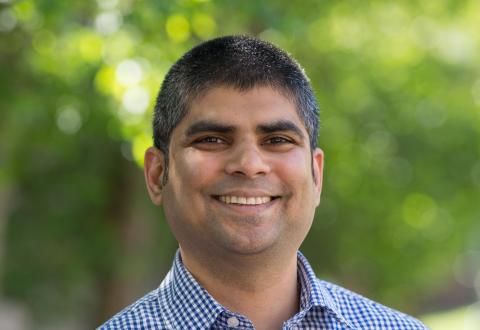
UVM Receives $1.25 Million DOT Award to Help Form Transportation Infrastructure Durability Center 
Dr. Mandar Dewoolkar, VT EPSCoR Resilience to Extreme Events in the Lake Champlain Basin (BREE) faculty researcher, chair and professor of the Department of Civil and Environmental Engineering at UVM, was awarded $1.25M from the U.S. Department of Transportation to create a highly competitive University Transportation Center (UTC) called the Transportation Infrastructure Durability Center (TIDC).
Dr. Mandar Dewoolkar is a member of the BREE Ecological Systems Team.
News Release — UVM July 19, 2018
Contact: Jeff Wakefield, UVM, 802-578-8830
University of Vermont, in collaboration with the University of Maine and others, will create a highly competitive University Transportation Center (UTC) called the Transportation Infrastructure Durability Center (TIDC). TIDC aims to help save taxpayer dollars by extending the life of our transportation assets, including bridges, roads and rail.
The U.S. Department of Transportation will provide as much as $14.2 million over five years for this University of Maine-led coalition, which includes the University of Vermont, University of Rhode Island, University of Connecticut, University of Massachusetts Lowell and Western New England University.
Mandar Dewoolkar, chair and professor of the Department of Civil and Environmental Engineering at UVM, will be receiving $1.25 million over five years to assist in the development of this regional initiative. UVM professors Ehsan Ghazanfari, Dryver Huston and Ting Tan collaborated on the proposal.
Additional partners include representatives from the Vermont Agency of Transportation; Maine Department of Transportation; Massachusetts Department of Transportation; Connecticut Department of Transportation; Rhode Island Department of Transportation; and the American Society of Civil Engineers Transportation and Development Institute.
“This is an exciting opportunity for UVM students, research staff and faculty to perform innovative research for improving the durability and extending the life of our transportation infrastructure," said Dewoolkar. "I look forward to this partnership with the University of Maine and others across all New England states, which will strengthen our collaboration in transportation research, education and technology transfer.”
New England’s transportation infrastructure faces unique challenges due to harsh winter weather and short construction seasons. According to the American Society of Civil Engineers, nearly 30 percent of New England roads are rated in poor condition which, on average, costs each motorist $584 annually in extra vehicle repairs and operating costs. Nationally, driving on roads in need of repair costs U.S. motorists $120.5 billion.
Working with state departments of transportation, the new TIDC seeks to identify new materials and technologies that maximize the impact of transportation infrastructure investments. The center will work along four pathways: 1) develop improved road and bridge monitoring and assessment tools; 2) develop better ways to strengthen existing bridges to extend their life; 3) use new materials and systems to build longer-lasting new bridges and accelerate construction; and 4) use new connectivity tools to enhance asset and performance management while promoting workforce development.
TIDC will harness the experience of 28 faculty researchers and train 280 student researchers from all New England states. It will focus on real infrastructure needs identified by the department of transportation partners and will prioritize extending the life of existing transportation assets to ensure cost-effectiveness.
Since 1987, the University Transportation Center program has advanced transportation research and technology at colleges and universities across the country. Every five years, academic institutions nationwide compete to form their region’s UTC.
The University of Vermont and other member universities of the new TIDC have an extensive record of accomplishments in transportation infrastructure research, education and technology transfer.
|